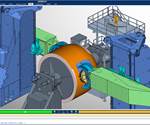Airbus selects MSC Software's MaterialCenter platform
The software platform will enable Airbus to more easily manage material workflow from one database across divisions.
Airbus Group (Paris, France) has chosen MaterialCenter, an end-to-end materials management platform from MSC Software (Newport Beach, Calif., U.S.), to reduce development lead time. With this platform, Airbus intends to provide access to a single material raw data database across its divisions.
According to MSC Software, which is a division of Hexagon (North Kingstown, R.I., U.S.), MaterialCenter targets the needs of aerospace materials data and process management. It is part of a comprehensive materials solution that covers virtual material development, materials testing, and standard and advanced multi-scale material modeling serving major finite element analysis (FEA) software and various manufacturing methods including automatic fiber placement (AFP) and additive manufacturing (AM).
Material Center is designed to manage the complete materials workflow as the single point of entry for all materials-related activities. It is said to enable a consistent source of approved materials derived from traceable integrated processes, resulting in improved simulation fidelity, reduced data loss and elimination of manual data management activities. MaterialCenter is also said to be highly scalable and suited to support a large number of users and amount of data generated and used by Airbus to engineer composite and metallic systems.
“We are extremely proud that MaterialCenter has been selected by Airbus as the end-to-end materials management platform for the group. We are looking forward to a strong, long-term partnership with Airbus as we implement and deploy MaterialCenter across the group. This will enable an effective and efficient use of materials and materials data to drive innovative and high-quality product development,” says Roger A. Assaker, CEO of e-Xstream and engineering and chief materials strategist of MSC Software.
Related Content
-
Plant tour: Aernnova Composites, Toledo and Illescas, Spain
RTM and ATL/AFP high-rate production sites feature this composites and engineering leader’s continued push for excellence and innovation for future airframes.
-
Proving thermoplastic composites match carbon fiber/epoxy performance in road bikes
CDCQ, LxSim, Addcomp and Argon 18 collaborate to optimize a carbon fiber/PA6 bike seat post, democratizing AFP and demonstrating materials and process for future designs and production.
-
Combining multifunctional thermoplastic composites, additive manufacturing for next-gen airframe structures
The DOMMINIO project combines AFP with 3D printed gyroid cores, embedded SHM sensors and smart materials for induction-driven disassembly of parts at end of life.
.jpg;width=70;height=70;mode=crop)





